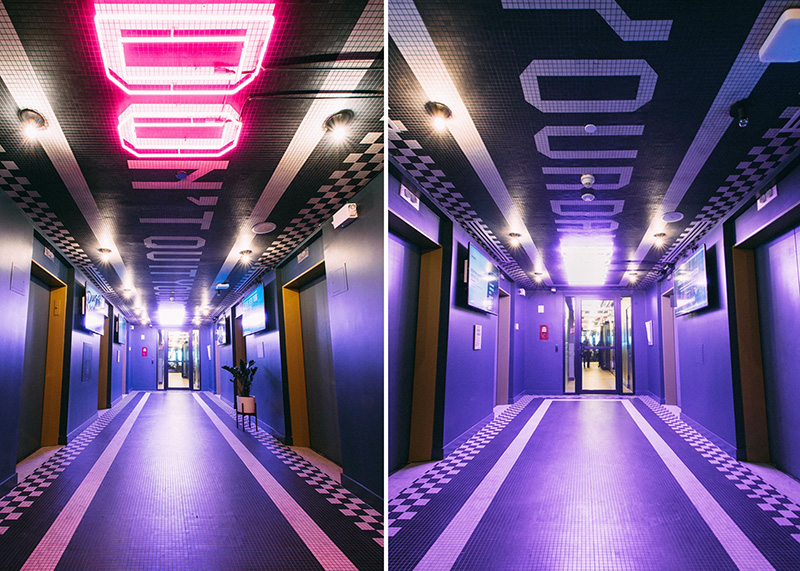I was recently working from WeWork at 222 Broadway in New York. I decided to wander the building to check out the design and see some of the members in the building. On the ceiling of one of the elevator lobbies, there’s a neon sign that says, “DON’T QUIT YOUR DAYDREAM.” That sign stopped me in my tracks. I stood there for an awkwardly long time looking up at it as people passed through the lobby. I was asking myself, Am I still living my daydream? Am I still doing what I dreamed of doing with my life?
My daydream started 20 years ago, inspired by my view into a small, dark, gray cubicle-filled basement workspace I passed each day on my walk to my office in Portland, Oregon. At the time, I was working on my first startup, in a unique space with lots of light, exposed brick walls, and bright colors. Seeing people work in that basement office day after day troubled me. I had recently graduated from architecture school, and as an idealistic designer, it didn’t make sense to me that we put so much energy and imagination into designing museums and libraries, but the places where people spent the majority of their time were mostly left behind.
Fast-forward 10 years to the start of WeWork. Our aspiration was based on the same empathetic response. We knew there were tens of millions of people working in soul-sucking cubicle farms. We imagined a world in which everyone would have the chance to walk into a workspace every morning that uplifted and inspired them, one that helped them do great work and make meaningful connections, and leave at the end of the day feeling good about the day they’d had. And we wanted to move fast, not because we wanted to become a well-known startup or achieve the hockey-stick growth required by venture capitalists. We wanted to create a better day at work for as many people as possible, as soon as possible.
It wasn’t easy. Opening just one building in Soho for 400 members was incredibly difficult. It took extraordinary effort by a passionate and dedicated group of people. Adam and I get the credit as cofounders of WeWork, but we had a great team from the beginning. (Thank you, Kyle O’Keefe-Sally, Lisa Skye, Lauren DesRosiers, Carlos Villamil, Danny Orenstein, Marga Snyder, Chia O’Keefe, Devin Vermeulen, and all the others who helped make WeWork what it still is today.)

When we were working on our second building at 5th Avenue and 34th Street in New York, I had a conversation with one of our team members that I’ll never forget. It was a time of intense pressure, stress, and anxiety—and he asked me if it was all worth it. I said the same thing then that I would say now:
Yes, it’s absolutely worth it.
Despite the challenges and setbacks we may face, we have the opportunity and obligation to positively affect the world. We are changing people’s lives every day. Every morning, when members walk into our buildings, our efforts and perseverance are validated, and we can see it happening right in front of our eyes. There are not many companies that offer you an opportunity to make a truly positive impact, and among the ones that do, even fewer allow you to experience it yourself, alongside your customers, on any given day, all over the world.
I’ve spent the past several weeks in meetings with a wide variety of team members—from Marcelo and the C level to our Community teams—and while there are many complex challenges and difficult situations, one thing I’ve seen consistently is a commitment to our mission and to our members. Everyone I talk to is here for something more than just an ordinary job. We all want to contribute, in our own way, to something that’s greater than any of us.
I know there’s also persistent curiosity and skepticism about WeWork. Now, more than ever, there are people inside and outside who have strong opinions about what we’re doing here, what we stand for, and what we’ll become. I truly believe that the story of who we are as a company is up to us to define. And thus, as we move forward, every single one of us has both the opportunity and the responsibility to be accountable for what we want to be and how we’ll get there.
For my part, I’m incredibly energized by what I see as a back-to-the-future moment. Focusing on our core business is a return to our strengths and empowers us not only to improve on foundational aspects of our business but also to innovate more specifically to support our mission. One key example is the process we’ve undertaken to reunite our community, technology, and design functions to create breakthrough products that will ignite inspiration and creativity for our members. This work is one of my key priorities: It aligns both our values and our strategic objectives, and it will help all of us feel like we’re a part of building something unique in the world.
You’ll hear more from us about this in the coming weeks and months, but we need to stay focused on these kinds of initiatives—the essential work that has made us the undisputed leader in an industry we created. The fundamentals of the WeWork experience that I daydreamed about 20 years ago… still keep me motivated every day to both become my best self and to help build a great company.
With overwhelming gratitude and appreciation for the entire WeWork team past and present—for all that you’ve accomplished, and for all that you will accomplish in the future, thank you.
Miguel
Patience and perseverance have a magical effect before which difficulties disappear and obstacles vanish.
—John Quincy Adams
